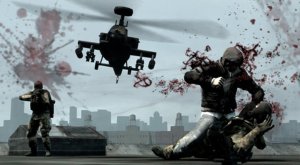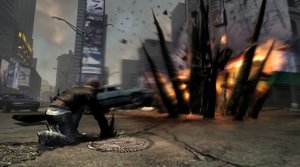This post has not been edited by the GamesBeat staff. Opinions by GamesBeat community writers do not necessarily reflect those of the staff.
This is a review I originally posted on my blog at RedRingCircus.com, enjoy!
 Prototype’s Alex Mercer is not a nice man. After waking up on the wrong side of a cold slab, he finds himself alive but amnesic. Riddled with bullets shortly after, he comes down with a mean case of superpowers. What follows is a murderous quest for answers, and a portrait of the most unlikeable protagonist ever. On the grand scale of evil, his questionable methods put him somewhere between Jack Bauer and Hitler.
Prototype’s Alex Mercer is not a nice man. After waking up on the wrong side of a cold slab, he finds himself alive but amnesic. Riddled with bullets shortly after, he comes down with a mean case of superpowers. What follows is a murderous quest for answers, and a portrait of the most unlikeable protagonist ever. On the grand scale of evil, his questionable methods put him somewhere between Jack Bauer and Hitler.
Manhattan, the center of the universe, is once again the punching bag for an epic disaster. The same virus that gives Mercer his powers also quickly zombifies most of the city’s population. Then, a black-ops organization known as "Blackwatch" (get it?) attempts to contain and cover-up the whole thing. If Mercer is a bad guy, then these are the badder guys. It’s a truly terrible and dirty situation, and the game shines brighter the more it revels in it.
In game time, you watch as 18 days of infection unfold. Manhattan is introduced with blue skies and clean, bustling streets – a light military presence is the worst of the city’s problems. But as the virus spreads, the boundaries between normalcy and crisis become clear. Entering the ever-growing infected zone is like a descent into madness. Busy Manhattan traffic becomes a massive pileup. A few feet away, crowds begin rioting, yelling for their loved ones as mutated beasts tear them to pieces. The event is bleak, affective, and only the tip of the iceberg.

As the situation escalates, you, as Mercer, do little to stop it. The goal here is to find answers, and you do so by consuming those who know the truth. Grab a suspect and Mercer will beat them to a pulp, absorbing them and their knowledge. Their memories are represented by a stylized collage of images with a brief voice over. A single memory doesn’t mean much, but as you weed out more and more targets, a plot begins to unfold. Those with a soft spot for conspiracy theories and paranormal documentaries will eat this stuff up.
It’s not all about snacking on people, though – throughout missions you’ll gain access to a laundry list of abilities that puts most RPGs to shame. Everything can be upgraded, from flying-squirrel jumping ability, to mutant arm weapons and your helicopter license. The effects are almost too tangible – the game isn’t very fun until you unlock some of the key moves. But when you do, and the powers begin to pile up, the controls never become unwieldy.
Prototype’s stew of dark storytelling, off-the-wall superpowers, and open-world gameplay often breaks the suspension of disbelief. Circumstances can get a little ridiculous, especially with the large amount of side missions that have you aiming for high scores. When hundreds of people have met their end by the treads of your stolen tank, you have to wonder why Mercer still has enough morality to stop Manhattan from being nuked out of existence.
Then there’s the unpredictability of the various denizens of the city. There are some genuinely evocative scenes where, despite a slew of repeated character models, the chaos is palpable. But it becomes harder to believe when you’re 15 days into the quarantine and there are still people stuck in traffic and going to work. Other times you’ll kill someone and onlookers will casually stroll by, indifferent to your actions. These holes in believability are just one of a few flaws in Prototype that suggest it was rushed to retail in it’s final months.

Despite a massive cityscape, the visuals of Prototype are simply bland. Often, things are so chaotic that you don’t notice. Perhaps that’s where the developer’s focus was, but it’s hard to deny the game could have used a few more graphics passes. Flat textures adorn each building, character models are heavily repeated, and you’ll see the same military base and infection hive copy/pasted throughout the city.
Those repeated buildings dampen believability even further. Why do infected structures rebuild themselves by the time you get to the end of the block? How could the military so quickly construct identical fortresses all over the city? It wouldn’t be so bad if you weren’t forced to sneak into these bases multiple times, stealthily consuming the same general over and over as half his men don’t bat an eye.
Prototype, despite its super-serious tone, constantly reminds you that it’s just a game. The result is a world that will often seem ridiculous and laughable in its presentation. If you can take the good with the bad, and allow it to take its liberties, you’re left with something that is often dark, tense, and most of all, ridiculously fun. At the end of the day, regardless of what you think of the events that unfold, the action is insane, and the controls are silky smooth. Prototype’s Manhattan is a joy to navigate, and Mercer’s encyclopedic repertoire of deadly powers make him an antihero you’ll begrudgingly love.
